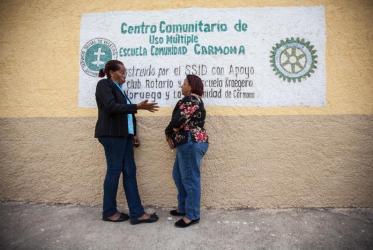Displaying 101 - 120 of 122
11 November 2015
Reclaiming our humanity
23 June 2015
Il faut reprendre possession de notre humanité
23 June 2015
Church leaders address statelessness in Dominican Republic
03 February 2015
Indigenous faith leaders reflect on resilience and climate change
23 September 2014
New UN document opens door for churches to do more for indigenous rights
23 September 2014
Use of armed drones condemned by WCC
13 February 2014






